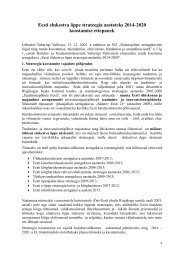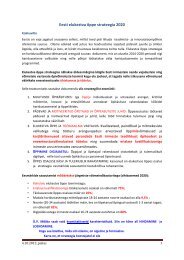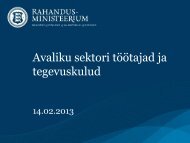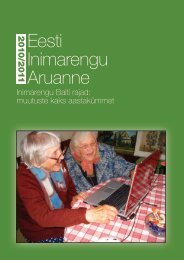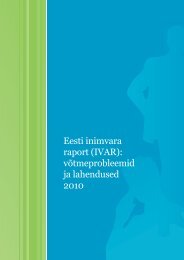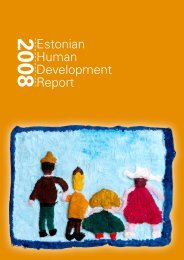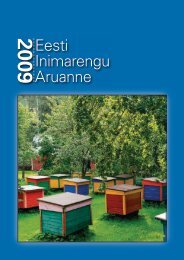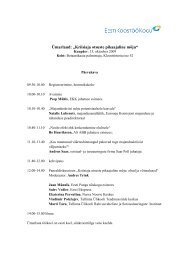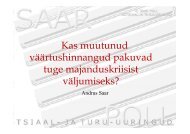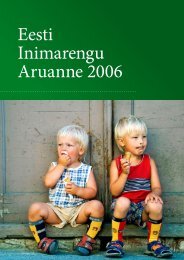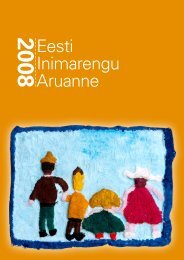DEVELOPMENT
The pdf-version - Eesti Koostöö Kogu
The pdf-version - Eesti Koostöö Kogu
Create successful ePaper yourself
Turn your PDF publications into a flip-book with our unique Google optimized e-Paper software.
Summary<br />
Mati Heidmets<br />
The global view of human development alludes to the<br />
fact that the size of the differences between countries and<br />
peoples are sometimes almost impossible to comprehend.<br />
The wealth per person, in the most advanced countries,<br />
is more than 50 times greater than in the least developed<br />
countries. In the computations of the years devoted to<br />
schooling,, the differences have stretched to being fivefold.<br />
Life expectancy in Europe is pushing forward into<br />
the eighties, while in many African countries it has yet<br />
to reach the fifties. The world continues to be split, and<br />
we are used to this. We are used to all kinds of rankings<br />
that start with Europe and North America, and end with<br />
Central Africa.<br />
Against the background of a split world, Estonia<br />
looks good. According to the 2013 UN Human Development<br />
Report, we continue to be a country with “very<br />
high human development.” On the global scale, Estonia<br />
is far from being a poor peripheral country, which how<br />
we sometimes see ourselves – actually we are significantly<br />
smarter, wealthier and more developed than the<br />
average, and a society that has coped well in the global<br />
marketplace. A position among the “highly developed”<br />
also presumes a corresponding mentality, including<br />
the understanding that helping those who lag behind<br />
is our duty and in our interests. Slowly, alongside the<br />
mentality of being a dependant and an aid recipient,<br />
a new, more self-confident and empathetic approach<br />
to the world is actually developing in this country,<br />
which is actually a truer reflection of our position in<br />
the global cauldron.<br />
Our rapidly changing position from being dependent,<br />
to being accountable, also means that a different<br />
attitude toward global matters is required. The concern<br />
about a deeply divided world is also Estonia’s concern.<br />
It is in our interest to work to mitigate these differences,<br />
be it through developmental aid; by spreading knowledge;<br />
or by distributing fishing hooks. Although not<br />
widely publicised in Estonia, one of the major largescale<br />
undertakings for smoothing over these gaps was<br />
initiated in September 2000, when the UN General<br />
Assembly approved the United Nations Millennium<br />
Declaration. The nations of the world accepted the task<br />
of working to resolve the most significant development<br />
concerns. Among other things, it was agreed to reduce,<br />
by 2015, the number of people suffering from hunger<br />
twofold, compared to the beginning of the century; and<br />
to halve the proportion of the world’s people whose<br />
income is less than one dollar a day. A very important<br />
goal is to ensure that all children complete a full course<br />
of primary education. At first glance, it would seem that<br />
these topics do not affect Estonia. Actually they do, very<br />
much so. Efforts to create a balanced and sustainable<br />
world are directly related to the efforts being made on<br />
behalf of Estonia’s future.<br />
A global, and therefore well synthesised, view of<br />
Estonia does not always coincide with how we see and<br />
assess our life and development internally. The closer the<br />
scrutiny, the more causes for concern there are – even<br />
in those fields of activity in which the rest of the world<br />
views us as being very successful. Let’s take education,<br />
our perennial trump card in various rankings. Estonia<br />
is characterised by both very well-acquired knowledge<br />
as well as by poor personal capabilities. Estonian people<br />
have sufficient knowledge, but lack self-sufficiency and<br />
self-confidence; there is little creativity or willingness<br />
to assert our erudition. The same thing is indicated by<br />
our continued Eastern European position on the map of<br />
the World Values Survey. Many fundamental values of<br />
Western life (tolerance, readiness to participate in the<br />
affairs of the society) are becoming rooted with great<br />
difficulty. Estonians have gained individual freedom, but<br />
filling this with positive and constructive content will<br />
take more time.<br />
Often enough, Estonia’s good average indicators hide<br />
unreasonably excessive differences within the society. A<br />
discernible split continues to exist between Estonians and<br />
the representatives of other nationalities. It seems that<br />
many non-Estonians have yet to become fully acclimated<br />
to the situation in re-independent Estonia, and continue<br />
to suffer from a kind of transition stress. This is indicated<br />
by a low natural population increase, which is significantly<br />
lower than among Estonians; by more dynamic<br />
emigration from the country; and by a lower degree of<br />
trust in the Estonian country. And the gender gap has<br />
become a dismal trademark of sorts for Estonia. We are<br />
the European Union champions not only in the sphere of<br />
sex-based salary differences, but also in the educational<br />
inequality between men and women – in Estonia, more<br />
than twice as many women as men acquire higher education.<br />
Maybe this odd distinction is the reason why so<br />
many young and educated women leave Estonia.<br />
In twenty years, Estonia has built a well-functioning<br />
country and energetic society. In global comparisons,<br />
we are praised for this. At the same time, it seems that<br />
a considerable segment of Estonians have not yet settled<br />
into their new environments, due to their resources,<br />
lifestyles or mentalities. Bringing a successful Estonia<br />
into the homes and souls of all those living in Estonia<br />
could be an important challenge for the next period of<br />
development.<br />
Estonian Human Development Report 2012/2013<br />
59



